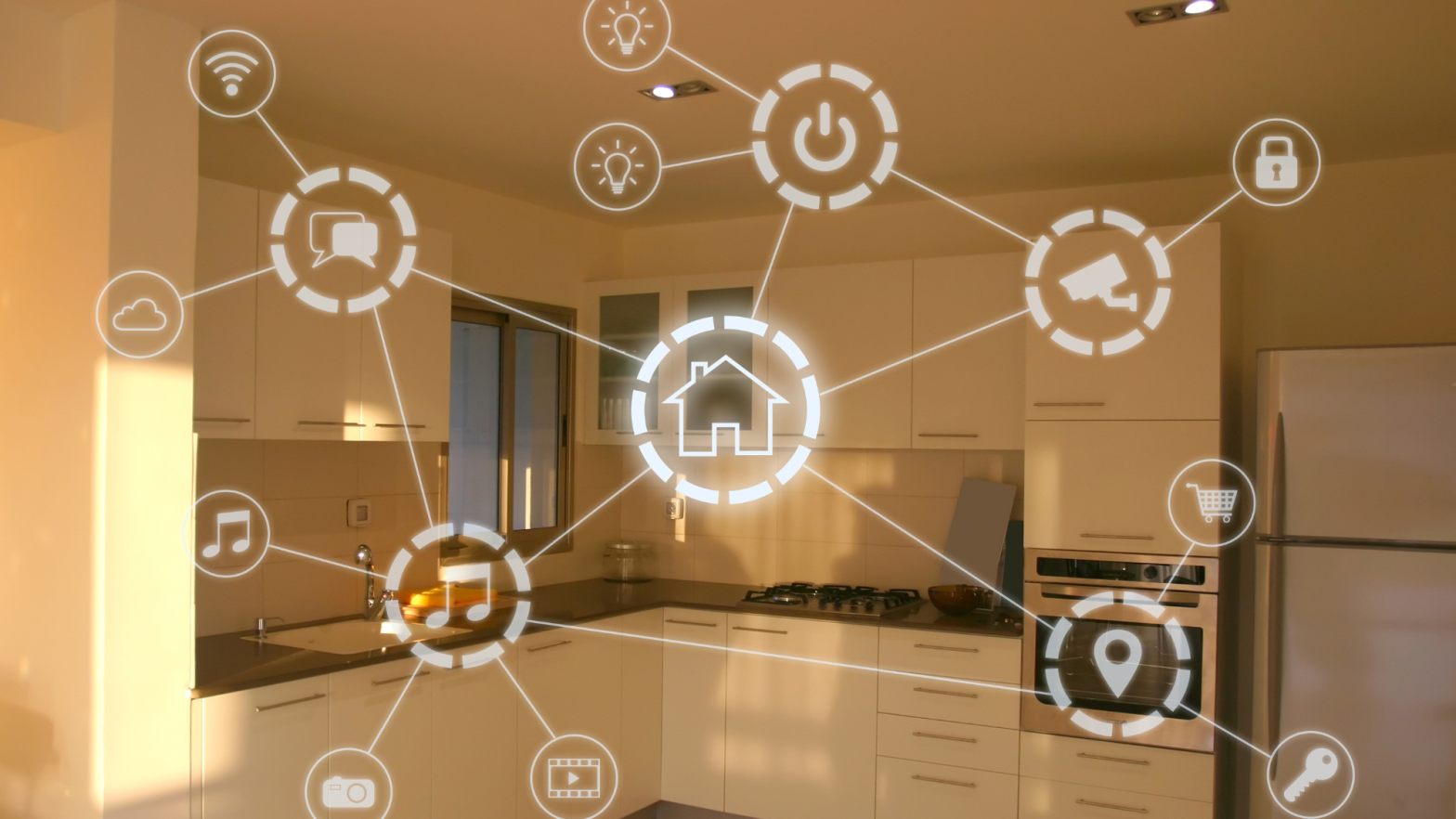Smart home technology has transformed the way we engage with our domestic environments, providing convenience and efficacy. The incorporation of smart home devices and systems has notably improved the functionality and security of residential properties. Furthermore, the adoption of smart home technology is on the rise, with a diverse array of innovative products and solutions readily available in the market.
The Evolution of Smart Home Technology
The concept of intelligent home technology can be traced back to the early 20th century, with the introduction of labour-saving devices such as washing machines and refrigerators. These early innovations laid the foundation for the evolution of smart home technology, shaping the way we interact with our living spaces.
Over time, advancements in technology have led to the integration of the Internet and AI (Artificial Intelligence) in home automation systems. This seamless connectivity and automation have revolutionised the concept of connected home systems, offering unprecedented convenience and control to homeowners.
The global smart home market is projected to witness substantial growth in the coming years. This expansion will be driven by increasing consumer awareness and the growing demand for connected living experiences. Furthermore, emerging markets present significant opportunities for smart home technology providers to expand their presence and offerings, catering to a wider audience seeking innovative and efficient solutions for their homes.
Understanding the Financial Landscape for Innovation
Types of Financing for Technology Innovation
- Angel Investors and Venture Capital: Seek funding from angel investors who provide initial seed money in exchange for equity in the company. Additionally, venture capital firms offer private equity financing to support startup growth.
- Government Grants: Explore government grants available for innovative tech initiatives, providing essential financial support.
- Business Loans: Access business loans tailored to fund research, development, and market expansion for startups in the smart home sector.
- Venture Debt: Consider venture debt options to secure funding for smart home innovations without diluting equity.
- Personal and Home Improvement Loans: Utilise loans like those offered by institutions such as Brighte to fund smart home technology investments for individuals and homeowners.
- Collaborations with Financial Institutions: Explore partnerships between tech companies and financial institutions to create innovative financing models, fostering seamless access to funds for smart home tech projects.
Challenges in Tech Sector Funding
- Research and Development Funding Decline: Research and development funding in Australia hit a 30-year low, raising concerns about the country being left behind in technological advancement.
- Start-up Funding Plummet: The venture capital industry experienced a sharp decline, with Australian start-up funding plummeting two-thirds from its peak. Investors halted deals, affecting the cash injection into tech ventures.
- Global Challenges: The tech sector grappled with global challenges, including a tumultuous year marked by slowing capital markets, war, and climate change. These challenges affected the sector’s dynamics and investment climate.
- Technological Shifts: The rise of AI in 2024 brings additional challenges, necessitating efforts to overcome obstacles like prioritising projects and building a data culture.
- Government Ambitions: While the Australian government aims for the tech sector to contribute significantly to the GDP, achieving this goal requires overcoming funding challenges and creating an environment conducive to innovation.
- Competitive Landscape: Australia’s tech sector must navigate a competitive landscape, with shifts and emerging opportunities requiring strategic adaptation for sustainable growth.
Australians seeking financing for smart home technology can explore options that affordable energy solutions and home renovation financing. You can also check out online loans to finance smart home technology. Friendly Finance emerges as a reliable Australian source offering legitimate loan options, potentially addressing the financing gap for consumers adopting smart home technology.
Loans as a Catalyst for Smart Home Technology Adoption
Loans play a pivotal role in facilitating the growth and expansion of smart home technology ventures. They provide essential financial backing for entrepreneurs and innovators to accelerate the development and deployment of their smart home solutions. Leveraging loans enables these individuals to invest in research, product development, and market entry strategies, thereby driving the advancement of smart home technology.
In Australia, the adoption of smart home technology has been facilitated by the availability of personal and home improvement loans. Through personal and home improvement loans, Australians can overcome financial barriers and embrace energy-efficient and technologically advanced home solutions. These loans are designed to cater to the specific needs of individuals seeking to enhance their homes with innovative technology.
The impact of financial products, such as personal and home improvement loans, on the rate of smart home technology adoption is significant. By addressing affordability concerns, these loans accelerate the adoption of smart home solutions among consumers. The availability of tailored financial products contributes to a positive market trend, as more Australians can afford and incorporate advanced technologies into their homes.
Government Incentives and Subsidies
- Solar Energy Incentives: Government schemes promoting solar energy, such as incentives, rebates, and subsidies, are available across Australia, contributing to the adoption of smart home technologies like solar panels.
- Research and Development (R&D) Tax Incentive: The Australian government offers the R&D Tax Incentive, providing tax offsets for eligible R&D activities, and encouraging innovation in smart home technology.
- Renewable Energy Switching: Incentives and subsidies, such as low-interest loans and subsidies up to $2,000, are available in states like South Australia, promoting the switch to renewable energy and supporting smart home initiatives.
The Future of Financing in Smart Home Technology
Green Loans for Eco-Friendly Tech
- Rising demand for eco-friendly smart home technology has spurred the emergence of green loans in Australia.
- These loans specifically cater to individuals seeking financing for environmentally sustainable home automation solutions.
Partnerships between Tech Companies and Financial Institutions
- Collaborations between technology companies and financial institutions are becoming prevalent.
- Tech firms and financial institutions join forces to create innovative financing models, fostering seamless access to funds for smart home tech projects.
Predictions on Evolving Loan Products
- Diversification of Loan Products: Anticipated diversification of loan products tailored for smart home technology, offering specialised financing for various aspects of home automation.
- Integration of Technology in Loan Processes: The integration of technology, such as blockchain and AI, in loan processes, is predicted to streamline and expedite financing for smart home innovations.
Challenges and Opportunities
Challenge: Market Maturation
The Australian smart home market may face challenges in maturity compared to the US; however, this presents an opportunity for growth and increased investment.
Opportunity: Future-Proofing Investments
Investing in smart home technology is seen as a future-proof strategy, creating opportunities for financial institutions and investors to align with the evolving tech landscape.
Navigating the Financing Landscape
Smart home technology offers convenience and efficiency, but financing these upgrades can be a consideration. Here are tips for consumers on financing smart home technology purchases:
- Set a Budget: Define a budget before delving into smart home purchases. Consider the areas where you’ll gain the most value and allocate funds accordingly.
- Consider Needs and Energy Efficiency: Prioritise products that align with your needs and are energy-efficient. Look for devices that not only enhance convenience but also contribute to energy savings.
- Explore Home Automation Gradually: Instead of transforming your entire home at once, consider a gradual approach. Start with essential devices and expand over time to manage costs effectively.
- Evaluate Long-Term Savings: Assess the potential long-term savings that smart home technology can offer. Energy-efficient devices and automation can contribute to reduced utility bills, justifying the initial investment.
- Financing Options: Investigate various financing options, including personal loans or home improvement loans, and choose the one that aligns with your financial goals and credit situation.
Advice for Startups and Entrepreneurs on Securing Funding for Innovation
Securing funding for innovation is crucial for startups and entrepreneurs. Here’s valuable advice to navigate various funding sources:
- Self-Financing: Consider using personal savings or resources to kickstart your venture. This demonstrates commitment and confidence in your project.
- Government Grants: Explore available government grants for innovative projects. Governments often offer financial support to encourage technological advancements and business innovation.
- Network and Family Support: Leverage personal networks and family connections for initial funding. Family and friends might be willing to invest in your innovative idea.
- Debt Financing: Explore loans as a financing option. While it adds a financial obligation, it allows you to maintain control over your business.
- Equity Funding: Seek equity investors, including business angels and venture capital firms. Pitch your idea effectively, showcasing its potential for growth and profitability.
- Partnerships and Collaboration: Explore partnerships with industry players. Collaborating with established businesses can provide not only funding but also strategic support.
- Stay Informed: Keep abreast of market trends and funding opportunities. Being well-informed allows you to align your pitch with current market demands.
Technology plays a pivotal role in enhancing financial literacy by providing accessible tools for learning, budgeting, and investment. Fintech is shaping online financial education, making it more efficient and accessible. Bridging the gap in financial literacy through technology is essential for inclusive financial services, ensuring underserved communities have access to essential financial knowledge and services.
The evolution of smart home technology has been intricately intertwined with innovative financing solutions, playing a pivotal role in reshaping domestic landscapes. The journey from early labor-saving devices to today’s interconnected systems, powered by IoT and AI, highlights the transformative impact on functionality and security. As the global smart home market surges, Australia, too, embraces this trend, offering financial avenues for technology-driven innovations. The financial landscape, including venture capital, government grants, and specialised loans addresses the challenges faced by startups and individuals in the tech sector. Loans, particularly personal and home improvement loans, have emerged as catalysts, fostering the rapid adoption of smart home solutions among Australian consumers.
The future holds promising trends such as green loans and collaborative models between tech companies and financial institutions, indicating a continued symbiosis between financing and innovation. As the Australian smart home market navigates challenges and opportunities, strategic financial planning and technological literacy will be instrumental in propelling the sector forward, creating a future where smart homes seamlessly integrate into our daily lives.


































